Author(s): Naga Lalitha Sree Thatavarthi
ABSTRACT
In today’s world of dynamically changing e-commerce, increasing the value for the customer has become one of the key factors for success. This paper aims to discuss the integration of Artificial intelligence-based chatbots with full-stack e-commerce platforms and the usage of sophisticated technologies like Angular, NET Core, and Node.js. This integration is an effective solution which directly tackles operational issues related to inadequate real-time support, the absence of personalization tools, and problematic order management to enhance business performance and customer loyalty. A proper explanation of the implementation process, along with the architectural diagrams, examples of pseudocode, and use cases, is presented in the paper, in addition to a discussion of the subsequent development of these technologies in e-commerce.
In the contemporary, ever-evolving sphere of e-commerce, the focus on the improvement of customer experience has emerged as a primary factor that can contribute to the organization's sustained competitiveness. The e-commerce platforms' problems include the lack of adequate RTCS, fewer approaches to personalization, and ineffective order management systems. Such matters can have direct effects on customer satisfaction and their tendency to continue doing business with the organization. The addressed can be solved with the help of combining full-stack e-commerce platforms with AI-driven chatbots. With the help of such enhanced tools like Angular, NET Core, and Node. The integration with js makes the interactions with the user smooth, quick support, and proper processing of orders [1]. AI-based chatbots mimic human interactions through an NLP system, which ensures the immediate delivery of appropriate solutions to boost the shoppers' experience. This paper discusses the general framework of such integration, coupling it with the relevant use cases and the possible consequences. Thus, concentrating on these critical areas enables commercial organizations to enhance operational efficiencies, further customer satisfaction, and higher retention levels.
Nevertheless, various difficulties remain in achieving the best outcome for both buyers and sellers in terms of using e-commerce environments. The primary issues include:
Currently, it is common for various e-commerce companies to fail to incorporate reliable real-time customer service support means through which they promptly address customers' needs and hence reduce their satisfaction level. Regular ways of support that can be delivered by e-mail or phone provide users with long case-handling times and ineffective problem-solving. The customers who need salespersons' assistance get frustrated due to the long time the salespersons take to attend to them, hence degrading the whole shopping experience. One possible drawback of this approach is the lack of real-time tools to help e-commerce companies that want to offer their clients highly efficient and prompt customer service [1].
Many online stores are unable to give recommendations that fit the individual customer's tastes, so shopping is rather unpersonal. Customization is very essential when it comes to the engagement of the customers and the improvement of the shopping experience as it creates ways for how businessmen or owners of online stores can suggest certain products according to the likes and the previous activities of the customers. Without adequate personalization solutions, it becomes impossible to introduce the products to the customers in a way that they will make the purchases. Due to this lack of personalization, the customer experience is lowered and is the result of sales and repeated patronage on the platform [2].
They slow down order processing and order fulfilment, and so they affect the level of customer satisfaction and thereby sales. Customers demand fast and efficient order fulfilment, but when the wrong systems are chosen, things go wrong, get slow, and messages are misconstrued. Such issues cause a delay in delivery, which makes customers unhappy and they can shift to other sellers they find online. In addition, ineffective order management overburdens the organizational functionality and adds pressure to the customer relations department, which results in the worsening of the situation. Solving all these problems is crucial for e-commerce platforms to provide reliable services that will make users trust the service and continue to use it in the future.
To address these challenges, integrating AI-driven chatbots into full-stack e-commerce platforms is workable. Maximizing Full Stack Development Technologies such as Angular, NET Core, and Node. js, consequently, real-time customer support, recommendation systems and an optimal order management facility are provided within this integration.
Real-time Customer Support using AI in the form of Chatbots Realizing the potential importance of quick responses to customers' inquiries, AI-powered chatbots can provide solutions instantly. These chatbots incorporate sophisticated NLP that allows them to understand customers' questions or inquiries and answer them properly. Thus, the use of chatbots in e-commerce strategy allows companies to help customer service 24/7 and solve their problems without involving a human user. This makes sure that the clients get the help they require at the right time thereby enhancing their shopping experience [2]. These elements include but are not limited to inquiries on the product, order status, return policies, and technical assistance, among others, leaving the human agents to attend to higher-level issues.
AI-enabled live chat services can also/or thus: Analyze customer data and by recommending the right products to clients who visit the store, sales are likely to increase. These recommendations are arrived at based on the customer's previous surfing history, shopping history and preferences. AI on this data to determine patterns and tastes, and so, the chatbots recommend products that may likely appeal to specific clients [3]. It not only ensures the probability ratio of selling something to the customer but also helps in improving the customer satisfaction level because they will feel that they are being sold something that they require. In addition, such tailored output can prove advantageous in guiding businesses to sell products that are complementary to the chosen ones or simply increase a product's price, which leads to higher revenues.
Extension to backend systems using dot. NET Core and Node. js helps in effective order handling: tracking of orders; storing, tracking of inventories; and connection with payment processors. Order management is a critical aspect that calls for efficiency in an organization in charge of satisfying customers. Through the use of full-stack development technologies, it is possible to establish an integrated system for order management right from the time it is placed to the time it is delivered. The real-time processing of orders enables customers to have timely information concerning their orders, reducing their anxieties [3]. Technology such as inventory systems that are connected to e-commerce allows for good management of the inventory in that clients are warned when certain products are out of stock or there is an excess supply. Moreover, integration with the payment gateways is also on the same page guaranteeing safe and optimized transactions, therefore increasing customer satisfaction.
Through the application of these solutions, the difficulties of providing real-time help to customers, customization, and order handling are solved by the e-commerce platforms
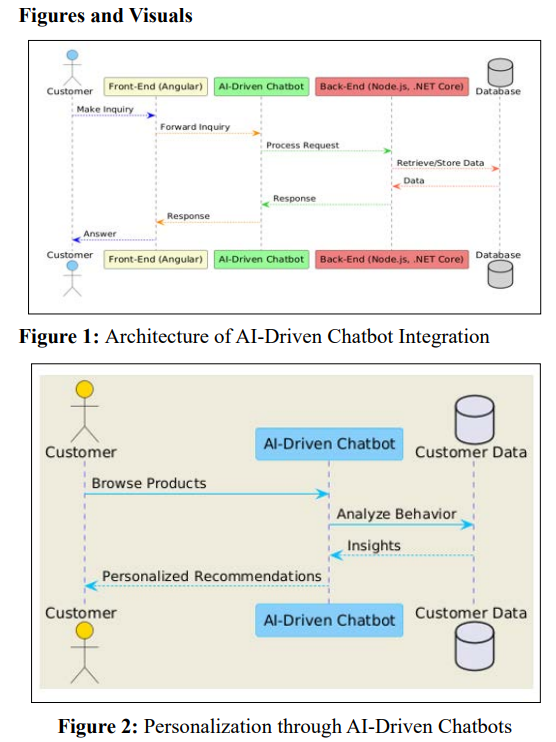
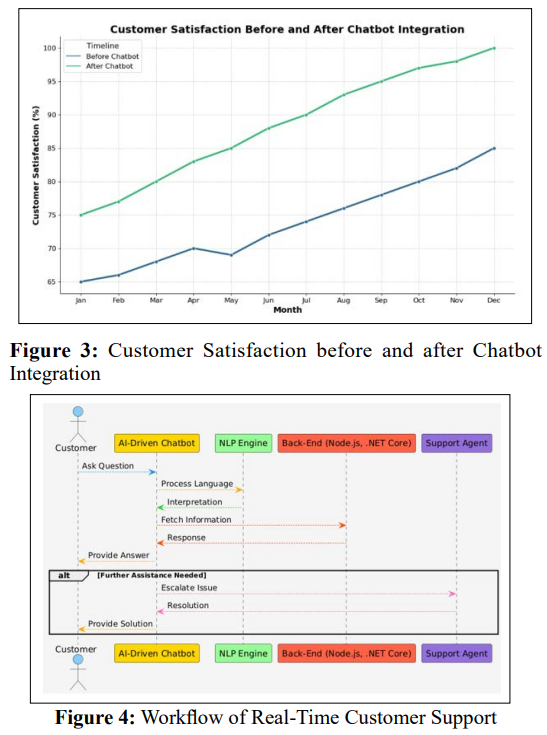

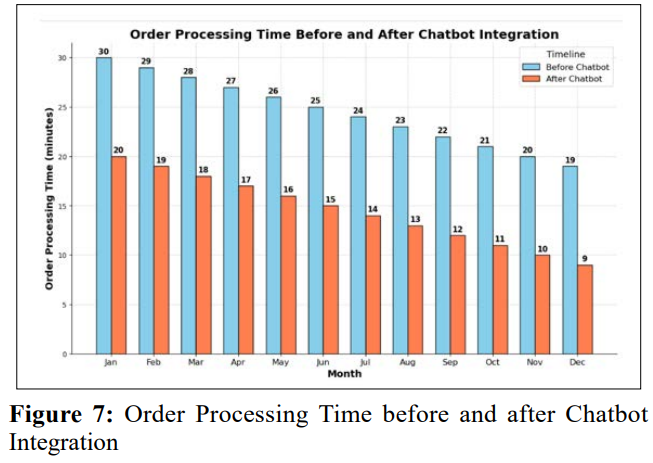
The use of incorporation of both full-stack e-commerce and AI- powered chatbots presents some of the following practical uses which can help in solving issues noted with the e-commerce platforms: Here is information with examples of particular use cases that show how this integration enables better customer support, an individual approach to the clients, better management of orders, and edge computing for immediate help.
There are several key areas for the AI application, which ones are the most effective will be explained below but the most crucial application is in customer support improvement. The conventional methods of support, which are usually through emails and phone calls, are said to take a lot of time, which in turn leads to the frustration of the clients, making them less satisfied. AI-generated and AI-assisted chatbots, on the other hand, give real-time responses to customer queries. Some of these chatbots are equipped with NLP and machine learning, which help the chatbots effectively and efficiently handle diverse questions from customers [4].
For instance, a customer who wants to know some products' availability or someone who requires help with a return could engage a chatbot that responds with the right information in the shortest time possible. This minimizes the amount of handholding needed to speak for the customers so that the customer service personnel can attend to more serious cases.
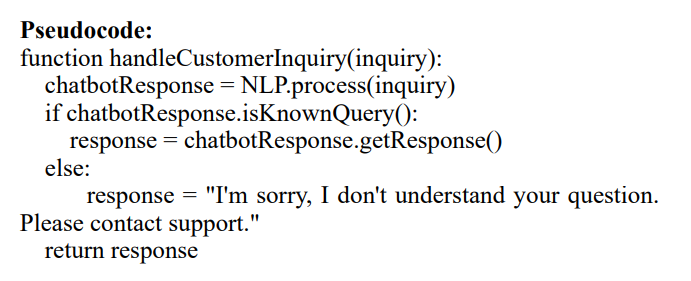
Enhancing Retailing using Retailer-Customer Interactions Another vital application of AI-based chatbots is to enhance the level of 'experience' by making it personalized. Even though the customer need not be a loyal one, their expectations from an organization are high, as they want recommendations and offers to be unique to their needs and actions. Chatbots have incorporated artificial intelligence to work with and understand customer data, which includes but is not limited to browsing history, previous orders and purchases, and preferences [4].
For example, if the customer was buying products like gym wear, and underwear, the chatbot can recommend new products in that category or the customer can be offered a discount on other related products. It refines the shopping experience while at the same time making the customer more likely to buy a product and recommend further products. Panoramic solutions enhance the customer experience since recommendations that are made are specific to customer preferences and therefore customers arguably feel appreciated by a specific brand and thus are likely to return.
Another subjective critical success factor is order management since it defines buyers' satisfaction as well as the firm's performance directly. AI-based chatbots aligned with the help of efficient back- end applications realized with the help of technologies such as. NET Core and Node. The applications of JS can help lessen and speed up all aspects of order management and handling. This involves real-time order tracking, inventory control, and integration with payment processors [5].
For instance, after a customer place an order, the bot can update the client on the status of the order, including processing, shipping, and delivery. Such transparency helps to calm down the customer and build up his trust in the platform. Also, centralised storage programs guarantee that inventory management is efficient and risks such as selling non-existing inventory or running out of stock are averted. Processing payments becomes more effective and safer through integration, which in turn enhances customer satisfaction.
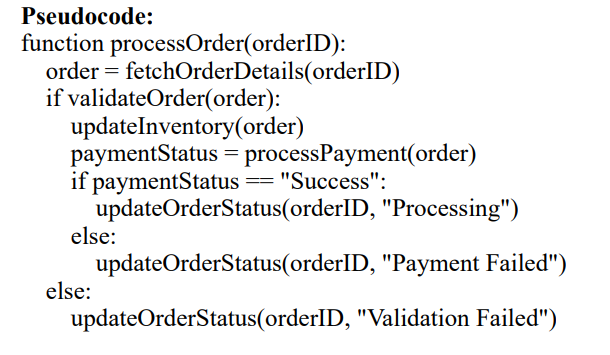
Real-time help through an artificial intelligence chat interface is another crucial area that is realized through edge computing. In essence, edge computing will analyze data close to the source which will minimize the delay and at the same time make information readily available. This capability is especially useful in e-commerce applications because customers can be helped right away, and a delay can lead to their dissatisfaction.
For instance, when customers are expected to make their purchases in large numbers like in the middle of the business days or Black Friday, their support and order expectations increase. The advanced load is something that edge computing makes it possible to manage the chatbots and offer the customers real-time help promptly.
The combination of AI-powered chatbots and full-stack e-commerce platforms is a powerful and complex system that goes beyond the simple enhancement of many points in the customer's path and business operations but fundamentally alters them. This impact analysis looks at how these technological advancements will improve customer functionality, operations, customer satisfaction, and retention.
The use of AI in chatbots when used together with e-commerce platforms increases customer satisfaction levels as they get the advantage of enhanced real-time support, recommendations and order processing. The provided immediate answers by the chatbots eliminate some of the hassles inclusive of long durations to a response and solutions from the conventional customer help services. These chatbots can comprehend customers' questions through NLP and respond to them in a timely and satisfactory manner. This real-time interaction helps the customer feel that they are being listened, to and valued, hence improving their shopping experience [5].
Other features like personalized recommendations, which is another major focus made possible by AI chatbots are other critical aspects that enhance the customer experience. Due to the effectiveness of the analysis of the customer's data, the chatbots can recommend products that match customers' preference and their previous conduct in the market. It is as a result of this level of personalization that the shopping experience becomes more interesting and leads to more calls to action and reasons for upgrading from a lower-level product to a higher one.
Complex full-stack technologies like Angular, NET Core, and Node. js also plays a crucial part in improving the parameters of backend activity and, respectively, the productivity of the operational work. These systems also help in the reduction of time required to process the orders as well as the management of inventories. It eliminates the middleman and delays related to order tracking and integrating the payment gateway with the orders placed.
For example, in real-time data processing, these technologies ensure that the company never oversells its products or even runs out of stock. It also improves the operations of a business because it helps eliminate instances whereby a customer orders a product online only to learn that it is out of stock or discover that their order will take a very long time to arrive.
The Last Few Themes are more Specific and Encompass the Activities Aimed at Enhancing the Level of Customer Satisfaction and, as a Result, Developing Customer Loyalty. A Contemporary model of real-time support, customer service with related offers and effective management of orders ensures more customer satisfaction and customer loyalty. This includes helping customers whenever they are in need or when they are recommending appropriate products and services, hence the customer satisfaction on the platform. Thus, customers are more likely to return to patronize the organisation's services to ensure they have the best experience in the market, thus high customer retention rates [6].
Furthermore, reliable order delivery implies that the customers are assured of efficient order fulfilment and delivery by the platform. This trust can enhance the long-term interaction between the platform and the users and can strongly influence the platform's result.
One of the biggest opportunities of the future is to continue developing AI integration with full-stack e-commerce sites and adding more features for chatbots. This future-proof solution can adapt to the change in needs of different kinds of business structures. The prospects for the following improvements are possible: the development of new AI technologies, the expansion of the system's multilingualism, the integration with the Internet of Things, and the enhancement of protection measures.
One of the most important future improvements is the addition of other superior AI algorithms to the system. With advancements in AI technology, chat development, and progression, these chatbots can become excellent at analyzing and anticipating the customer's requirements. This includes, for instance, better accuracy in the recommendations and the context behind such precision, as well as enhanced conversational skills. The use of machine learning and deep learning concepts can be utilized to enrich the level of the chatbot's communication and recommendations to customers and ultimately improve the user satisfaction level.
For a consolidated worldwide response, it is crucial to expand the interaction scope of the chatbot by making it support as many languages as possible. These findings have shown that proper multilingual support measures can be useful for enhancing organisations' e-commerce operations when serving customers from different countries and with different languages. This implies not only translating text but also selecting the cultural and preferred language for the audience in distinct regions [6].
Here it is possible to pin the idea of extending the application of chatbots connected with the help of AI together with IoT devices to provide customers with additional convenience during the purchasing process. Smart machines can also engage in conversations with IoT chatbots to receive up-to-date information on stock levels, delivery status or other special promotions. For example, a customer will be informed through their smart fridge from a chatbot that their groceries have been delivered or that they can prepare meals using the contents of the fridge, thereby promoting ease and interaction.
Since e-commerce platforms deal with large volumes of consumers' details, security standards should be carefully integrated. A possible improvement to the best of the future work is to enhance the measures of data protection to guarantee the clients' privacy. These are such things as encryption of data and communication, the use of multi-factor authentication, and constant scanning for threats. If e-commerce firms place security on a high priority, then customer information will be protected to provide a worthy image [7].
Thus, future work on the integration of AI-based chatbots with full-stack e-commerce platforms will have potential research directions. When it comes to the future development of e-commerce, the further development of AI, the implementation of multilingual talents, IoT, and security will help e-commerce companies further extend their value-addition and deliver excellent customer experiences.
The amalgamation of AI-driven chatbots with full-stack e-commerce platforms can be regarded as a giant step in building up the interactive experience for customers. Thus, using such technologies as Angular, ., the company will succeed in performing the aforementioned objectives. NET Core and Node. js, these platforms provide opportunities to offer instant customer support, targeted product suggestions and effective systems for orders' management. This symbiosis eliminates both the existing shortcomings, namely, delayed responses, generic approaches to shopping, and ineffective order management, as well as increasing efficiency [7].
The laid-out tangible benefits include increased customer satisfaction and loyalty as bank customers, thus resulting in increased customer retention. Due to the ever-developing field of e-commerce, it becomes crucial to implement such intertwined, AI-based innovations. They offer a competitive advantage, which allows organizations to deliver and even surpass customers' expectations in every way possible. Thus, adopting these innovations is not simply a strategic move but rather a necessity, especially in the increasingly crowded field of e-commerce. The future therefore holds the possibility of even more of these integrated systems, more developments, and more involved customer interactions.
